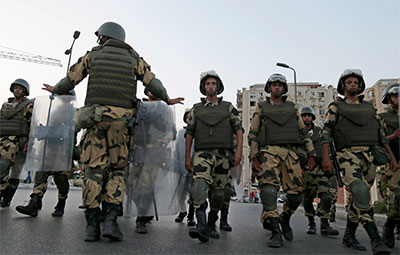New York, July 3, 2013–The Committee to Protect Journalists today called on the Egyptian military to refrain from exercising editorial control over state-owned media as the country’s political crisis deepens.
“Those in power have long used state media as their political tool,” said Sherif Mansour, CPJ’s Middle East and North Africa Coordinator. “But in these critical times, when Egyptians are desperate for independent information, the news media should not be political pawns.”
The army has maintained at presence at state television headquarters since Hosni Mubarak was ousted. However, the station was allowed to broadcast President Mohamed Morsi’s speech Tuesday night rejecting military intervention. Today, special units entered the newsroom to monitor content and ensure the military’s messages are broadcast, news reports said, but staffers said the troops did not interfere. The army on Monday demanded that Morsi address the demands of millions of demonstrators within 48 hours or face unspecified intervention.
Information Minister Salah Abdul Maqsoud, a Morsi ally, was forced to leave the state TV building today, according to news reports. His post–long used to manage the flow of information, primarily through editorial control of state media–had been briefly suspended after Mubarak stepped down in 2011, but it was reinstated by the military. Despite expectations that he would abolish the post after taking office, Morsi instead appointed his ally.
Egyptian law effectively ensures that state-run outlets follow the editorial line of the Ministry of Information, and journalists critical of the government have been punished with suspensions or dismissals.
- For more data and analysis, visit CPJ’s Egypt page.
